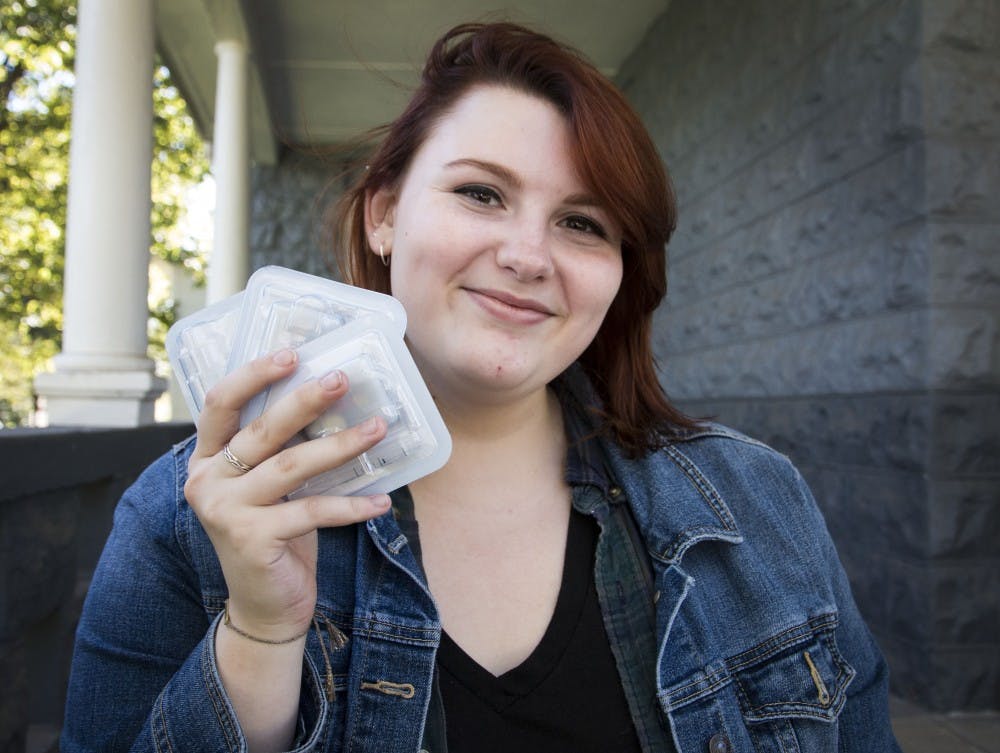For many, the amount of carbs in a piece of pizza oozing grease onto a flimsy paper plate or the abundance of sugar in a sticky, neon pink cloud of cotton candy isn’t much of a concern. Diabetics, however, must remain vigilant in tracking the amount of sugars in everything they eat.
Peyton Jones, a sophomore telecommunications major and co-president of the College Diabetes Network at Ball State, is familiar with tracking her sugar intake and insulin levels in her day-to-day life.
When she was 11 years old, Jones was told she had an autoimmune disease that caused her body to attack the cells that produce insulin, the hormone that regulates her blood sugar. Her diagnosis? Type 1 diabetes.
During that year, she began losing hair, lost 80 pounds and made visits to Riley Children’s Hospital to learn how to regulate her diabetes. The challenge Jones now faces is staying in tune with her body’s blood sugar levels.
“You have to worry about things that not everyone else necessarily has to think about, for example, how many carbs are in a piece of pizza,” Jones said. “You always have to worry about if your blood sugar is going to go high or low.”
Low blood sugar might mean an inability to participate in athletics or activities and high blood sugar could cause an overload of the body’s ability to process sugar, causing a “crash” in energy levels.
“It put a lot more planning into my life, making sure you have everything for every possible scenario,” Jones said. “Suddenly, I had to test my blood sugar before every meal. Even if you’re just going to the amusement park or on a walk with friends, you have to make sure that you have snacks and a water.”
To help her keep track of her insulin levels, Jones had been using insulin pumps for 3 ½ years, which make it easier for diabetics to remember to take their insulin and automatically calculates the amount of insulin the body needs after each meal.
In March 2017, however, Jones couldn’t afford to pay her insurance deductible that allowed her to purchase the pumps and had to resort to taking insulin shots. When using shots instead of insulin pumps, diabetics must be more proactive in administering insulin and keep track of their blood sugar levels on their own.
When Tanner Barton, a Ball State alumnus, heard Jones was unable to afford insulin pumps, he stepped in to help.
Barton created the College Diabetes Network at Ball State about three years ago and has been influenced by diabetes in several ways. Barton has Type 1 diabetes and was concerned when he found that Ball State did not have a CDN chapter.
“We have close to 22,000 students, undergraduate and graduate level students, who definitely have the need, so why don’t we make it happen,” Barton said.
Barton and Jones met through CDN, but the donation he gave was made possible by a familial connection he had.
His sister, Brittanee Barton, received a donation of insulin pumps to give to Tanner to aid any diabetic he may know after Brock Taylor, Brittanee's boyfriend, died from cardiac arrest caused by low blood sugar levels.
Barton gathered the donation and told Jones to come pick up the “surprise,” but when she arrived Barton only had a trash bag.
“He opened up this trash bag full of all of these [insulin] pump pods and I started crying immediately,” Jones said. “I couldn’t believe it at all.”
Jones was not expecting the gift and said she is thankful to Taylor’s family and to Barton. Lisa Mallone, Taylor’s mom, said she is pleased the insulin pumps were able to go to someone who needed them.
Moving forward, Barton hopes CDN remains a support network and a haven where students can establish friendships with other students who have diabetes.
Having organizations such as the CDN helps students with diabetes connect, advocate for one another and support each other, like Barton was able to with Jones.
“Sometimes it’s nice to look into someone’s eyes and say, ‘I know what it’s like to deal with a high blood sugar in class’ or, ‘I know how hard it can be when your blood sugar gets low when you’re hanging with friends,'” Barton said.
Contact Adam Pannel with comments at arpannel@bsu.edu.




